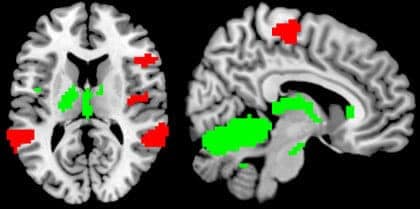You’re driving on a busy road and you intend to switch lanes when you suddenly realize that there’s a car in your blind spot. You have to put a stop to your lane change — and quickly.
A new study by Duke University researchers suggests that this type of scenario makes a person less likely to remember what halted the action — for example, the make and model of the car in the blind spot.
People and non-human primates excel at “response inhibition.” Our sophisticated brains allow us to cancel an action even when it’s something engrained, like driving on the right side of the road. Although it’s not easy, we can override this inclination when we drive in foreign countries with left-hand traffic.
The new results, published Aug. 26 in the Journal of Neuroscience, lend insight into how the ability to inhibit an action — a fundamental aspect of everyday life — affects other important brain functions such as attention and memory. The findings may eventually inform the treatment of disorders characterized by difficulty inhibiting actions, such as attention deficit hyperactivity disorder (ADHD) and addiction.
Last year, for a study published in Psychological Science, Tobias Egner, an assistant professor of psychology and neuroscience at Duke, and postdoctoral researcher Yu-Chin Chiu decided to test how response inhibition affected memory.
In that study, participants completed a computer-based task in which they were asked to press a button if they saw a male face but withhold a response if they saw a female face. (Some subjects were asked to do the reverse.) They looked at a total of 120 different faces.
After five minutes of a filler task that had nothing to do with faces, the participants were then given a surprise memory test in which they viewed faces and were asked to indicate whether a face was new or familiar from the earlier task.
“We didn’t really know which way that would go,” said Egner, who is a member of the Duke Institute for Brain Sciences. “You could argue quite easily that canceling a response to a stimulus might actually make that stimulus more memorable.”
However, they found the exact opposite: Memory was a little worse on the faces for which participants had to inhibit their responses.
In the latest study, Egner and Chiu saw the same results. But this time they wanted to understand why.
One potential reason people were forgetting the faces was that withholding a response was siphoning off their attention. Egner and Chiu tested this hypothesis by scanning the brains of participants, using functional magnetic resonance imaging (fMRI, a noninvasive, indirect measure of brain activity) as they completed the tasks.
These trials showed the particular faces that people later forgot were the same ones in which fMRI was showing that a known inhibition network in the brain had been strongly activated.
In addition, the brain areas that are known to be active when a person is committing something to memory — including a region in the front of the brain called the ventrolateral prefrontal cortex — were suppressed on those trials in which the participants had to inhibit their responses strongly. Not surprisingly, the subjects had poorer memory for those faces. “You don’t encode those stimuli well when you have a high inhibitory demand,” Egner said.
The new result supports Egner and Chiu’s original idea of a see-saw relationship in the required brain demand that underlies response inhibition and memory. They think this can help explain variations in the participants’ recall ability.
In addition, although such a connection is speculative, the findings may help support the observation that children with ADHD who are trying to override their inclination to fidget may not be able to focus as well. “Trying to inhibit these habitual actions might take a lot of resources, which takes away from paying attention,” Egner said.
Response inhibition is only one of many forms of control the brain exerts in everyday life. Egner’s group is now studying whether and how other modes of control — such as rapidly switching tasks — affect memory.
The research was supported by the National Institute of Mental Health (R01 MH 087610).


